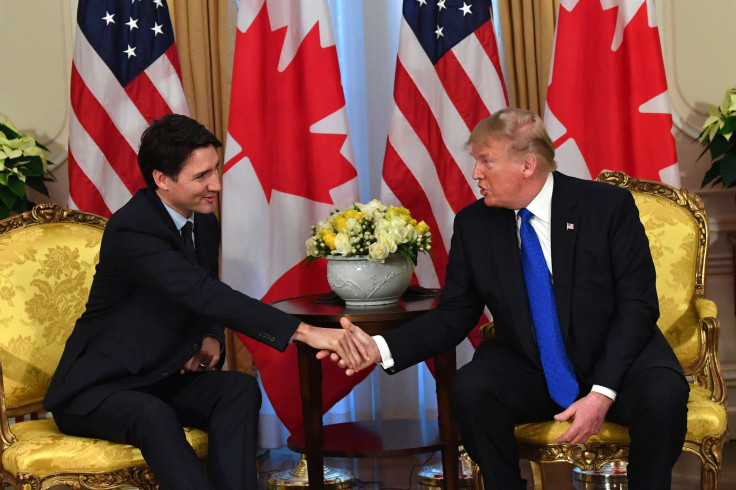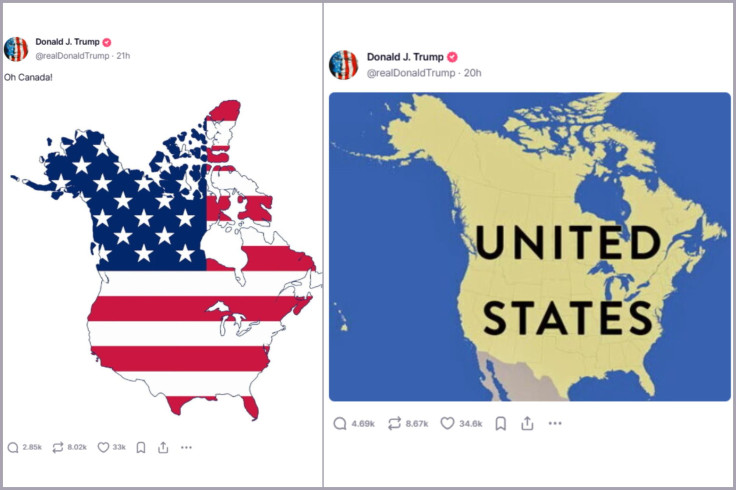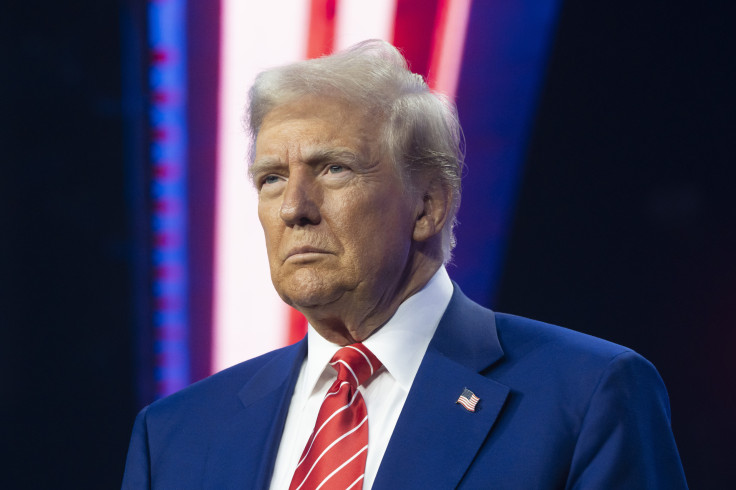
Ahead of his inauguration, President-elect Donald Trump has gloated over making Canada the 51st state of the union, mocking outgoing Prime Minister Justin Trudeau as a "governor" and threatening to use "economic force" to absorb the North American neighbor. But as questions of its feasibility remain, such a scenario could backfire for the GOP.
Canada has a historically progressive society, and bringing its 40 million people into the U.S. political system could provide a political boost for Democrats, tilting the scale in a future electoral college.
It remains unclear whether Trump is serious about annexing Canada, whose leaders across the political spectrum have profusely refused to join the U.S. However, his threats should be taken seriously, said Alyssa Batchelor-Causey, a Democratic Political Strategist from Hill and State Strategies. She said that even if such a scenario were to materialize, questions about the U.S. political systems would arise. But should it continue like it is, it would be a boon for the Democratic Party.
Batchelor-Causey is a seasoned strategist who worked as a Youth Organizer for the Obama campaign in 2008 and has worked to elect Democratic policymakers and pass progressive legislation nationwide. She recently sat down with The Latin Times to discuss Trump's threats and their impact in the geopolitical scene, not only in North America but across the globe.
This conversation has been edited for length and clarity.
Latin Times: What do you make of Trump's approach to his second term, considering he has mentioned Canada, Greenland and even the Panama Canal to be in his sights?
Alyssa Batchelor-Causey: Reflecting on his proposals, there really is no way to know if he's being serious or just kind of saber-rattling, trying to kind of puff his chest up coming into his second term. Now, he has said that he plans to be a dictator on Day one and his close allies have said that they— and I don't remember the exact quote— but something to the effect that his first day or first week in office is going to be shocking, essentially, to the country, and that's what they're planning. So when it comes to Canada, in particular, there is no way for Trump's administration to execute the annexation of Canada without military invasion, right, and that would shift the global balance of power so drastically that it would almost trigger a World War. Canada, of course, is under the protection of the British crown and that would be a huge shift away from our allies and would certainly trigger some sort of military conflict there. In a world war scenario, if they were going to take Canada by force, it would shift the global power dynamic, it would completely alter and drastically change domestic and international politics that there is really no way to know just what it would do to politics within the country but also globally as well, and what impact that would have on the political process.
LT: Should his threats on making the 51st state in the country be taken seriously?
ABC: We absolutely should. He's the incoming President of the United States, and he will have access to the full might of the military as the commander-in-chief, as well as the nuclear codes. So we should absolutely be taking this seriously, even though it is something that would be so drastically devastating to the country and our relationships with our allies. It's not a smart thing to do, but that doesn't really matter. It's what he is going to do, whether it's smart or not, and for that we'll kind of just have to see. But everybody in both the intelligence community and American citizens, the press and the media, should be very, very concerned about this type of rhetoric and what that would mean and the consequences of those actions.

LT: Canada is often considered a liberal safe-haven. Now that Prime Minister Justin Trudeau is leaving his post and a conservative movement reportedly taking strength in the country. Do you think this is still the case today? Does Canada resemble the Democratic or Republican party more?
ABC: Don't get me wrong, there is a very loud minority in Canada of conservatives, but even the conservatives in Canada are drastically different than the conservatives in the United States. They're more of a centrist conservative party, what we would consider to be a center-wing party than a true conservative Republican Party. Canada is much more progressive and has much more progressive, liberal politics than even that of the Democratic Party [in the U.S.], it is probably more so aligned, I would guess from what I know, with the with the AOC, Bernie [Sanders] wing of the Democratic party than it is with you know what is typically referred to as the establishment wing of the party. So yes, when it comes to party politics in particular, most Canadians would probably fall under the Democratic party in a two-party system.
LT: If Canada were to become the 51st state, what do you think it would mean for the Democratic Party in terms of its electoral strategy? How might this shift the balance of political power in Congress and the Electoral College?
ABC: Essentially, if we got to a place where, for whatever reason, the Democratic party decided to accept the annexation of Canada, which I highly doubt, and the Canadians were also to accept that they are a state of the Union, which again, I highly doubt. If those things were to happen that would basically be like adding another California to the country and so that's why I think electorally, they would get the same number of representatives, they would get more electoral representatives, they would get two members of the Senate, if they're treating the entire country of Canada as one state. It just would be like adding another California to our Congress and that, again, would dramatically shift the balance of power in favor of a left wing party. But I also think that because Canada's politics are so much more progressive than the United States' is, that the Democratic party would have a real problem. This fight between, you know, the kind of more progressive and establishment wings of the party that would become [stronger], I mean, the progressive party would vastly outweigh the more establishment wing of the party at that point.
LT: As you mention, Canada is much more progressive than the U.S., having different policies such as universal healthcare, stricter gun control laws and vast environmental policies. How do you think incorporating these policies into the U.S. system would influence the national political discourse?
ABC: I mean, I think that the discourse that is already going on between these halves of the party, and kind of the larger political factions of Republican and folks more on the extreme right and those Democrats who are more on the progressive end, you know, those conversations would continue. We've had conversations in this country now for decades about universal health care and enjoining other countries like Canada and others in the European Union and the UK in having some sort of national health care, right? I think those conversations would continue and those calls would be louder, especially if we were to get to this point.
LT: What about in terms of action? Would the U.S. shift ideologically? Would the country become more liberal?
ABC: That greatly depends on a lot of different things, and that also depends on whether we're still able to have free and fair elections, first of all. Under a Trump administration that's imperialist and is annexing territory, I'm not confident that that would be the case. There's a myriad of things that they could do to prevent that from happening. And so, in a perfect democracy, yeah, probably. But, again, I don't see, just from a political strategy perspective, other than the resource element, how this would be advantageous for Trump and the Republican Party long term, this would create more problems than it would solutions. Yes, sure they would get the kind of energy piece of Canada and what they have in terms of oil and whatnot. But if they were to become a full statehood, with full citizenship, where these folks are voting and making decisions that can sway the balance of power, and we are still in a democracy in which we have free and fair elections, it would not be advantageous for them. So if they were going to pursue this seriously they would have to account for that. The way that I think that they would account for that, is to not make them a state at all but to rather keep them as a territory, like I said, much like they have with Puerto Rico and Guam and and our other territories as well.
LT: What are some of the broad political implications for the U.S., as well as other global superpowers, if Canada were to join the Union? What does this say about a country's sovereignty, and could this trigger pushback from other global powers?
ABC: The implications are, globally, our allyship with Germany, France, the United Kingdom, all of these would be greatly damaged, and even with the European Union in general and even probably NATO, would probably be deeply, deeply damaged. I don't know that we could ever really fix that kind of damage if that were to be done. I think internally, my assumption is that the Democratic party would stand against an unwilling annexation of Canada, and that if Canada were to be annexed in some sort of war, essentially, as a state, and not a territory and they would have full voting rights as members of Congress, the Democrat party and the "Canadian state" the Democratic party would support them in their independence, and that's immediately what would happen. Obviously, if you go through the entire trouble of annexing an entire country that has 41 million people then you're not going to let that happen. [If Canada becomes a] state, that would grant them power under the constitution, unlike places like Puerto Rico and Guam and all of our other territories, which you know, do have representatives and delegations to Congress, but don't really have any voting power. So that becomes a little bit more of an issue, to have 41 million additional "citizen non-citizens," which would be more likely the political play there. To make it a state would not benefit Trump in any other way other than he would have access to Canada's energy resources, which I think is what he's after, but granting the people of Canada full American citizenship with all of the rights that a state has would not be a smart political move for him.

LT: As the Democratic Party moves forward and it seeks to rebuild itself after the November election defeat, should they keep these imperialist efforts in mind? What are some recommendations they should keep in mind ahead of the new Trump administration?
ABC: They should absolutely keep this kind of imperialist rhetoric that we're hearing from the Trump administration in mind. He may not follow through on his threats, but he's still the sitting president with access to the military and our nuclear codes, so that should not be taken lightly. So definitely keeping those in mind, keeping an eye on it. But, also have a very, very slim [majority] in Congress right now. They have a trifecta in the presidency, the Senate and the House and also have a conservatively packed Supreme Court, which is most certainly going to become more conservatively packed during this administration. There is very little in the legislative context and at the federal level that Democrats can really do.
Right now it's going to be on improving the electoral strategy for 2026 and the midterms, hopefully winning back some of that power that we lost to the Republicans this cycle, working on reaching um Americans where they're at, because clearly doing the normal media strategy, even social media to some extent has become extremely fractured and therefore very difficult to actually reach people where they are. And so, spending a little bit more time and energy into finding voters where they're at and also strategizing about ways to really combat misinformation because that's really what it comes down to is a lot of misinformation and disinformation is being spread, Republicans use that to their advantage to sow chaos and discord and mislead the American people and lead them into a fearful place, and when people are fearful, they make decisions based out of fear, they make decisions because they're scared of the potential consequences of that fear.
That's been a Republican strategy for a long time, and so I think that we, as Democrats, really need to think seriously about how we talk to people in a way that gets them to move past and out of that fear and anger, and into what can an actual solid foundation for America look like where it prioritizes the American people over the interests that Trump seems to be aligning himself with, with the likes of Elon Musk, Peter Thiel and Mark Zuckerberg. The Democrats, I think as a party, need to think about how we point out the facts that, for instance, when Mark Zuckerberg talks about the elite, it's kind of ironic because he's the person that he's talking about. And just kind of getting people to break out of that outrage cycle that they're in, reading the news and being on social media and being fed, just complete disinformation and misinformation both by Russian bots, but also, by their own fellow Americans and people who have a vested interest in keeping them misinformed.
© 2025 Latin Times. All rights reserved. Do not reproduce without permission.




